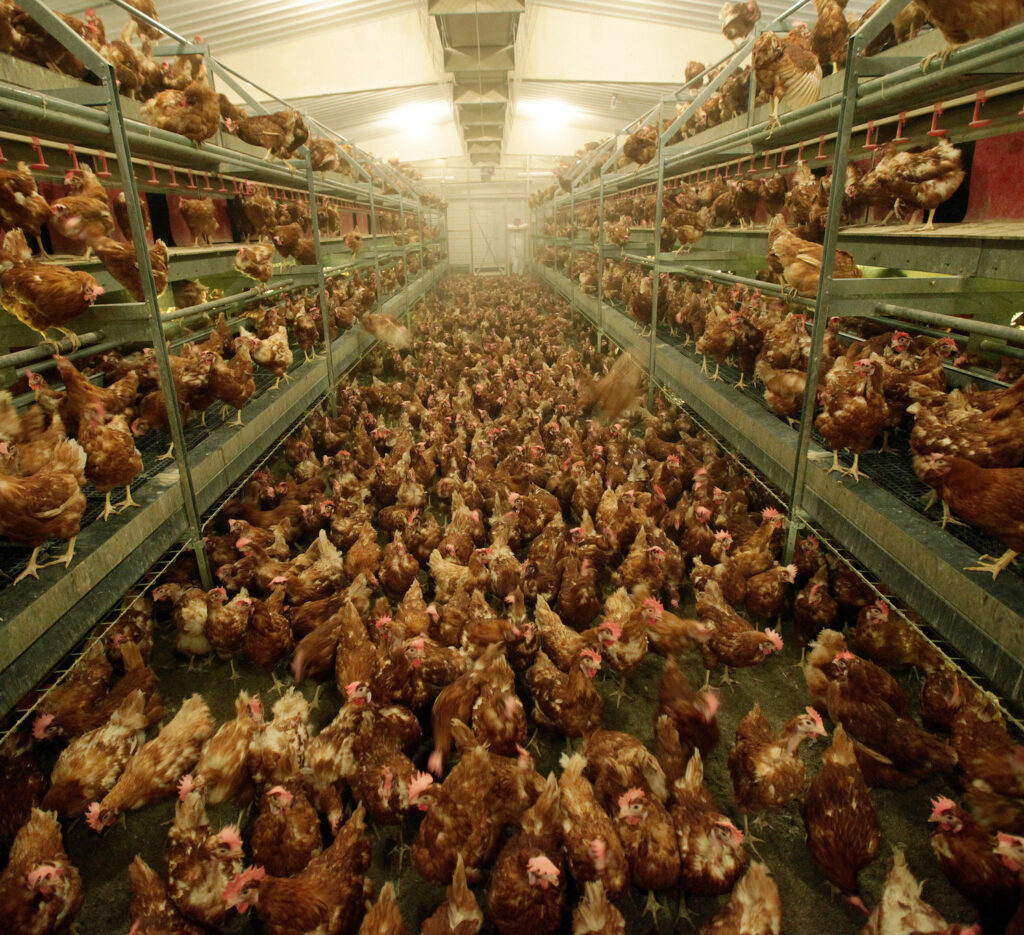Eggs seem to be one of those foods that have way too much confusion surrounding them. There are so many words and phrases thrown around regarding eggs, so let’s take a brief moment to clarify what each one means:
Conventional eggs: These chickens are confined to a space of 67 sq. in. (about the size of a MacBook), they have their beaks and wings clipped so that they don’t peck at the chickens right beside them, and they are stuck in these confined spaces for their entire lives.
Picture a large barn full of thousands of chickens whose lives consist of eating low-quality, inexpensive grains and laying eggs. As you can imagine, there is a lot of filth and disease that fills these warehouses.
Conventionally Raised Chickens:
The chickens are in cages their entire lives, are only fed grains (corn and soy), and are very unhealthy and unhappy.
These are eggs that will be packaged with no indication of a particular way the chickens are raised.
The color of the eggs: Brown eggs don’t mean healthier eggs. The color of the eggs only define what breed of chickens laid it. Eggs can be white, brown, pink, blue, yellow, green, and pretty much any shade in between.
Vegetarian-Fed: This does not mean they are the healthiest simply because chickens are omnivores.They should not be fed a vegetarian diet because chickens naturally forage for bugs, worms, baby snakes, etc. If you’re buying chicken that is “vegetarian-fed” then they didn’t get to do what chickens naturally do. If they were outside, then they would be eating bugs; so vegetarian-fed is a company basically saying that their chickens were always inside with only grains and corn as their food.
Organic: This means that the feed the chickens eat is pesticide-free and antibiotic-free. Really the only difference is the quality of food they eat, but it does not mean that they were able to roam and forage on pastures.
Cage-Free: Cage-free hens are not stuck in cages the size of a MacBook like conventional eggs, but they still don’t have much room to roam, much less be outside in pastures. Plus, there is no indication that what they eat is anything healthy.

Cage-Free & Free-Range Chickens
Chickens still have no room and are in very unsanitary, stressful conditions. Still fed corn and soy. The difference between cage-free and free-range is that free-range have “access” to the outdoors, but it has been found at many farms that this “access” is just a small window… in other words, the chickens still can’t range free. There are some farms, however, who do let their chickens range free, so not every company is the same. I would do some research and visit farms that claim to be free-range and cage-free to see the actual conditions the chickens are living in.
Free-Range: This is slightly better than cage-free. The USDA’s guideline for free-range is that the chickens must have “access” to the outdoors, but it does not define how large the outdoors are, nor does it define how accessible the outdoors are. In many cases, it’s found that they only have a small “pop-hole” to the outside. Free-range chickens are at least known to be in better health than conventional and cage-free, but it’s not the most ideal situation because they still don’t get to be in their natural habitat which is outside roaming on pastures, eating lots of bugs! The bulk of their diet is still corn and soy, which is not natural for them to eat constantly.
Pasture-Raised: This is the gold! Pasture-raised chickens get to roam free and forage bugs, seeds, worms, and really do anything and everything that chickens love to do. The minimum square-footage requirement for pasture-raised chickens is that each chicken gets 108 sq. feet to roam (that is quite different from the 65 sq. inches of commercial chickens). They are outside year-around on rotated pastures, but have access to housing where they can protect themselves from predators at night or during inclement weather.

Pasture-Raised Chickens
The happiest a chicken can be! Pasture-raised chickens get to roam free and forage bugs, seeds, worms, and really do anything and everything that chickens love to do. They are happy, healthy, and get to enjoy life to the fullest!
So to summarize, pasture-raised eggs are the healthiest and most humane eggs to buy. The eggs have significantly more nutrition since the chickens are raised in a healthy environment with all of their natural foods. The eggs contain more vitamins (such as vitamin B12, Niacin, Vitamin A and vitamin E to name a few) and they also contain more Omega-3 fatty acids and less Omega-6 fatty acids (so they naturally have a more balanced Omega-3 to Omega-6 profile). So how about we all decide to start supporting more ethical poultry farms? Plus, it’s fun to use reusable egg baskets to get fresh eggs! Remember, we are what we eat EATS!














Pingback: Easy Quinoa Breakfast Wraps » Home Cooked Living